Originally published on SoundStage! Xperience
HiFiMan HE1000 measurements can be found by clicking this link.
 Try to build the ultimate loudspeaker and you’ll end up with something costing hundreds of thousands of dollars. The ultimate pair of headphones, on the other hand, might cost less than a midpriced high-end stereo amplifier. We’ve recently seen attempts at creating the ultimate headphones, including such models as the Audeze LCD-3 ($1945 USD), the Abyss AB-1266 ($5495), and the resurgence of the classic Stax line, which tops out with the SR-009 ($4450). Now come the HiFiMan HE1000 headphones ($2999), from the company that did much to inspire the recent interest in high-end ’phones.
Try to build the ultimate loudspeaker and you’ll end up with something costing hundreds of thousands of dollars. The ultimate pair of headphones, on the other hand, might cost less than a midpriced high-end stereo amplifier. We’ve recently seen attempts at creating the ultimate headphones, including such models as the Audeze LCD-3 ($1945 USD), the Abyss AB-1266 ($5495), and the resurgence of the classic Stax line, which tops out with the SR-009 ($4450). Now come the HiFiMan HE1000 headphones ($2999), from the company that did much to inspire the recent interest in high-end ’phones.
The HE1000s are a huge step up in price for HiFiMan, whose other current models top out at $1299 (HE6). They’re also a step up in sophistication. HiFiMan says that the HE1000s’ planar-magnetic diaphragms -- the thin polymer panel in each earpiece that moves back and forth to produce sound -- is the first that’s so thin its thickness is measured not in micrometers but in nanometers (i.e., not in millionths but in billionths of a meter). Judging from the video on the company’s website, which shows a sheet of the diaphragm material floating very slowly down when dropped, it looks to have less mass than a single ply of tissue paper. Of course, these diaphragms also have conductors layered over them, which greatly increases the total mass; but still, such thinness is impressive.
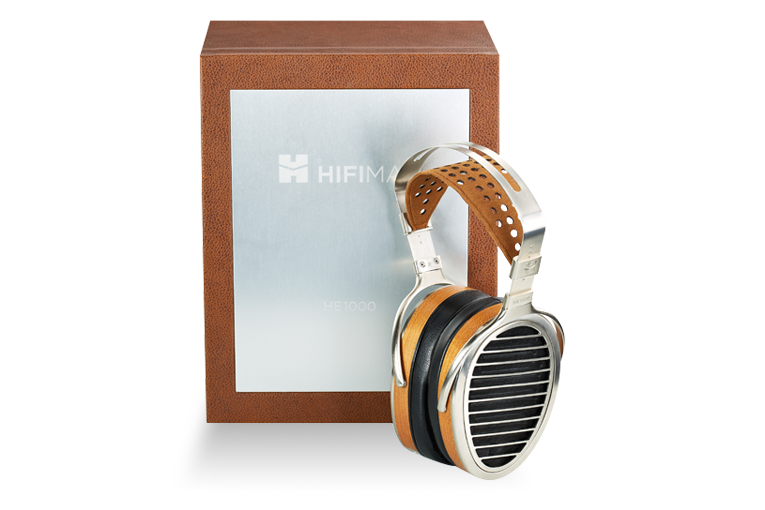
The HE1000s also benefit from the asymmetrical magnet arrangement developed for the HE560 and HE400i ’phones. This design reduces the amount of magnet and grille material between the diaphragm and your ear, which should in turn reduce sonic colorations. A patented “window shade” design that serves as the rear (outward-facing) grille also helps minimize reflections and colorations.
Befitting a $2999 pair of headphones, the HE1000s include numerous luxury materials, including wooden earcups, earpads made from a combination of soft leather and velour, and a stainless-steel headband with a leather head strap.
In the box
As we’ve come to expect from high-end, audiophile headphones, the HE1000s come in a fancy storage box -- although, to my eye, it’s not significantly fancier than the one that comes with the HE560s. But I’m no box expert. I do wish that HiFiMan had provided a travel case -- like the Pelican-style flight case Audeze includes for its headphones, or the semi-hardshell case HiFiMan used to provide with the HE500s.
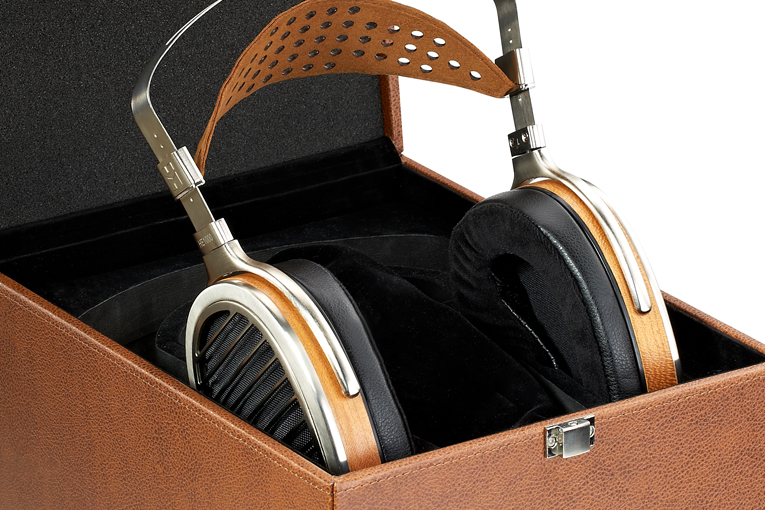
The box also includes two cables, one tipped with a 1/4” headphone plug, and one tipped with a four-pin XLR connector, for use with headphone amps that offer balanced output. There’s no cable with an inline remote for your smartphone -- these headphones are clearly not designed for portable use.
Use
Some audiophile headphones aren’t as comfortable as I’d like; many are heavy, and some put too much pressure against my temples and/or jaw. The HE1000s are one of the four or five most comfortable audiophile headphones I’ve worn. They’re light -- 25% lighter than, say, the Audeze LCD-Xes, according to my scale -- and the headband’s clamping force is not annoyingly tight.
I reviewed an early-production unit fitted with a head strap that was a little too long. It fit my XXL head fine at the minimum size adjustment, but it’s since been replaced with a shorter strap that should fit just about anyone.
I found only one thing less than cozy about the HE1000s: The velour of the earpads didn’t feel as comfortable against the side of my face as, say, the leather of Audeze’s pads; it gave me a slight sensation of prickly heat. A lot of people must like velour or I’m sure HiFiMan and other manufacturers wouldn’t use it, but for me, the best use of velour is for paintings of matadors or Elvis.
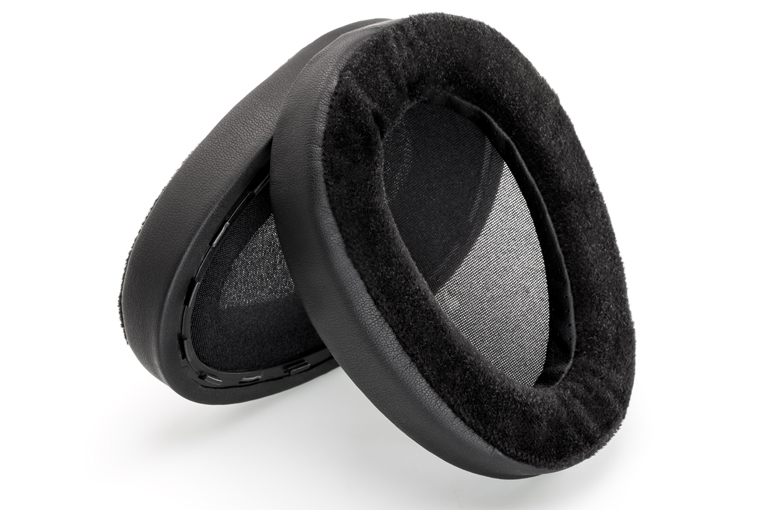
The HE1000s don’t come with a cord that plugs into the 3.5mm minijacks found on smartphones, computers, and tablets. However, I was surprised to find, while driving the HE1000s with my Samsung Galaxy S6 smartphone via a 3.5mm-to-1/4” adapter, that the HiFiMans were sensitive enough to produce a reasonable amount of volume. It didn’t sound great -- the tonal balance was softened, and the phone’s internal amp didn’t control the bass well -- but it was still far better than the sound of a typical smartphone. Ridicule the use of $2999 headphones with a smartphone if you like; the truth is, most of us listen to music and other programming sourced from mobile devices, and being able to plug your top-quality headphones straight into these devices is a nice convenience.
That’s not to say that the HE1000s were especially sensitive. I had to turn the Aurender Flow headphone amp-DAC up to within about 8dB of full volume to get a satisfying level with typical pop music. With the Audeze LCD-Xes, I get a comparably loud level at a volume setting 12dB lower.
Sound
In my first listens to the HE1000s after breaking them in, I heard a generally neutral sound with just a trace of treble emphasis and an extremely convincing, realistic reproduction of space -- but I could say much the same of the HE560s. Only in direct comparisons with other headphones did the HE1000s demonstrate their superiority. Using the Aurender Flow to drive the HiFiMans, I spent a lot of time comparing the HE1000s to two other high-end, open-back, planar-magnetic models I had on hand: HiFiMan’s HE560 ($899) and Audeze’s LCD-X ($1699).
Recordings of classic jazz are still the standard I mostly use to judge the sound of high-end headphones -- it’s the music I most care about and most frequently listen to. The best classic jazz sides have tons of sonic detail, in large part because only acoustic instruments were played, and were recorded with a minimum of processing. A great example is The Gene Ammons Story: Gentle Jug (16-bit/44.1kHz WAV, Prestige), an early-1960s recording that documents the burly sound of tenor saxophonist Gene “Jug” Ammons.
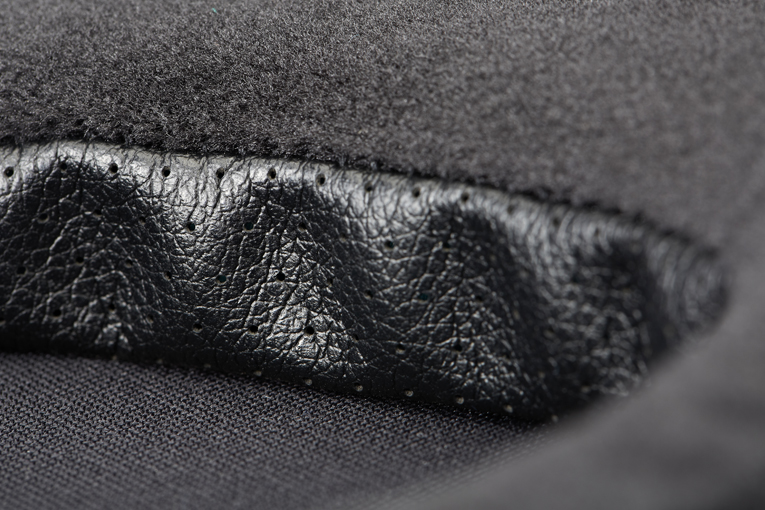
With “I Remember You,” the HE1000s sounded lively and lifelike. I got all the wonderful, natural breathiness and power of Ammons’s legendarily robust tone. The HE1000s made it easy to hear that some reverb had been added; his sax was mostly isolated in the left channel, and so was the reverb -- not a natural effect unless you’re in a studio that’s half acoustically live and half acoustically dead. The cymbals -- to me, the toughest instrument for headphones to reproduce accurately -- sounded like real, unadulterated cymbals made of spun brass, not some inferior metal and/or augmented with rivets to make them sizzle. (Many headphones make cymbals sound as if they’re made from aluminum or sheet steel or even old baking pans.) For my taste, the HE1000s had perhaps 0.5 to 1dB too much treble with this recording, but they sounded a long way from bright. I guess bassheads would find the sound thin, but I doubt any open-back headphones would deliver enough bass to keep such listeners happy.
The Audeze LCD-Xes also sounded terrific with Gentle Jug, with a spacious, natural sound that’s hard for all but a very few headphones to match -- an impressive performance, especially considering that they cost $1300 less than the HE1000s. The Audezes’ tonal balance was subtly mellower; as a result, I heard a bit less breathiness in Ammons’s tenor and a little less sense of space. Of course, I can’t be sure which is the correct presentation; my guess is that the HE1000s leaned a hair toward the bright side, the LCD-Xes a hair toward the warm. With the HE560s, the tonal balance was almost the same as through the HE1000s, with just a trace less treble, but the treble didn’t sound as smooth; the cymbals sounded more as if played with sticks of hard plastic instead of wood.
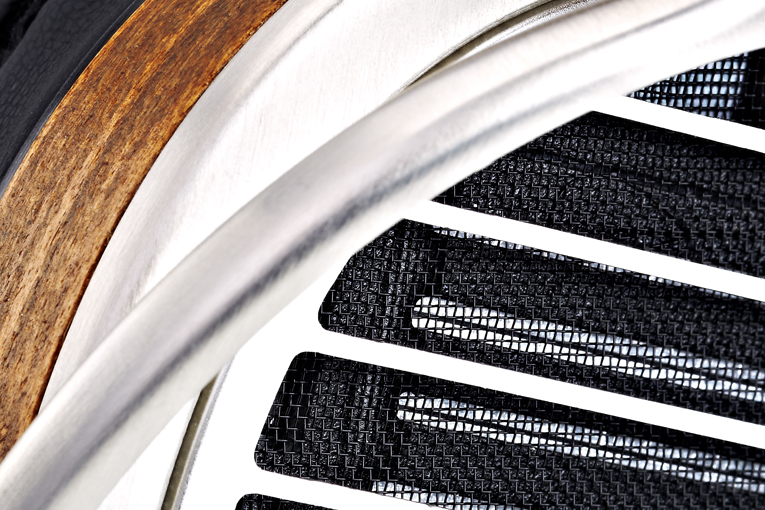
The HE1000s just as impeccably reproduced the sound of a radically different recording: “Rollin’ and Tumblin’,” from Jeff Beck’s You Had It Coming (16/44.1 WAV, Epic). Singer Imogen Heap’s half-moaned vocal sounded solid through the HE1000s, almost as if it had materialized in space -- much the same effect I hear from a pair of great speakers, but inside my head instead of out in the room, between the speakers. The heavily reverbed chords from Beck’s guitar that end the main riff floated above and to the sides of my head, as if I were hearing the performance in a small gymnasium. The LCD-Xes’ sound quality was very close to this, although, as I’d experienced with the Gene Ammons track, the sound was a bit darker and a little less ambient. Both headphones produced a coloration of a slight coarseness in Heap’s voice: the HE1000s in the lower treble, and the LCD-Xes in the upper midrange, 1000Hz or so lower. Through the HE560s, Heap’s voice sounded overall more coarse, less realistic, and less solidly imaged, and the HE560s couldn’t match the HE1000s’ huge ambience.
The difference was less dramatic when I played “Alone by the Ganges,” from From the Ashes (16/44.1 WAV, Water Lily Acoustics), an album of acoustic duets by violinist L. Subramaniam and guitarist Larry Coryell. I liked the HE1000s’ portrayal of the light, airy sound of this recording best, mainly because of their beautiful, natural, more convincing presentation of space, and the detail and texture in the instruments. The LCD-Xes provided a fuller, more robust reproduction of the lower frequencies of Coryell’s guitar, but didn’t have quite the HE1000s’ apparent detail in the treble. The HE560s’ treble wasn’t as smooth -- in fact, it sounded a little “twangy” on the guitar -- but it still delivered a great sense of a space and a just-right tonal balance. (In fact, this comparison confirmed for me what a great buy the HE560s are for $899.)
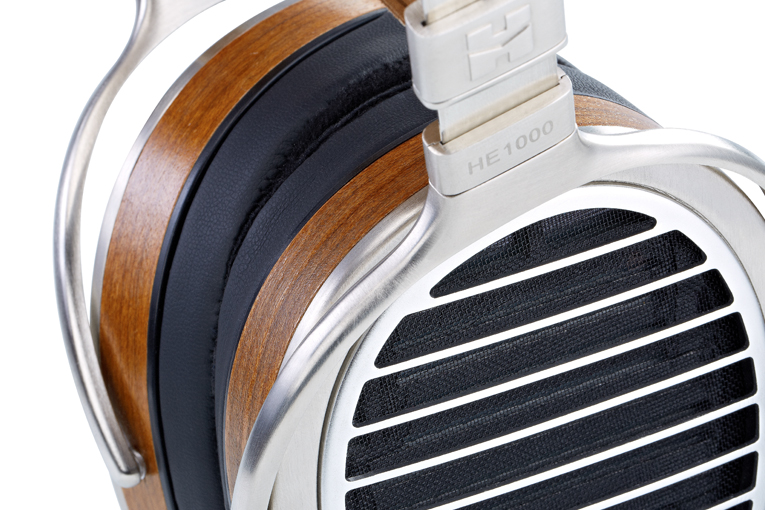
Even on a fairly standard piece of pop music -- Glen Hansard and Markéta Irglová’s performance of Hansard’s “When Your Mind’s Made Up,” from the soundtrack of Once (16/44.1 WAV, Columbia) -- the HE1000s proved their near perfection. I felt I’d somehow connected my brain straight to the artists, so natural was the sound and so negligible the colorations. I especially loved the sense of space around the snare drum; I could almost feel its presence in the room with me. And again, I loved the way the HE1000s created such solid virtual images of the voices.
Trying to find a nit to pick with the HE1000s, I began streaming lower-quality recordings through my computer and the Aurender Flow, thinking the HE1000s’ detail might highlight recording flaws. They certainly didn’t cover up flaws in recordings and digital files, but neither did they accentuate them, as some high-end speakers and headphones do. For example, when streaming from Amazon Prime “Honey & I,” from Haim’s Days Are Gone (256kbps VBR MP3, Columbia), I noticed some subtle coarseness and spittiness in the voice of whichever Haim sister sings lead on this tune, and also in the hi-hat cymbal. But that’s in the recording itself, not the headphones; the HE1000s revealed the flaw without so highlighting it that it commanded my attention. Which is exactly what consumer headphones should do.
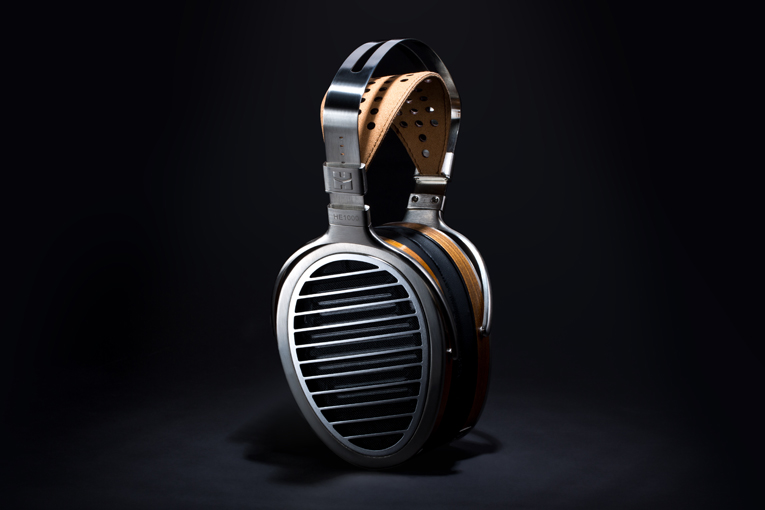
Over the course of more than a month of listening, I could find nothing to dislike about the HE1000s. Some might say they sound a little too bright -- but I wouldn’t, and I hate bright-sounding headphones. They’re probably the most spacious- and detailed-sounding headphones I’ve tested, and their design is well thought out from every angle. Many audiophile headphones are recommended with serious caveats -- they’re heavy, or they need to be driven by a powerful, expensive amp, or they don’t produce enough bass, or they don’t sound good with low-quality recordings. But every time I wore the HE1000s, they sounded and felt great for hours.
Conclusion
I’m always skeptical when I read rave reviews of some new product. It’s so easy to be impressed with something new, sometimes just because it sounds different from what you had before. Sometimes, when I listen to a product that’s gotten a rave review, I wonder: What’s so special about this thing? That’s why, when I write a very positive review, I try to be careful; I worry that I’m reacting to little more than the product’s newness, or the hype in the press release.
In the case of the HiFiMan HE1000 headphones, I’m not worried. These headphones really are so good that I’m confident in raving about them, and confident that you’ll largely agree -- maybe even totally agree.
I don’t know if the HE1000s are the ultimate headphones. But considering their impeccable sound quality and above-average comfort, I think they’re the closest thing I’ve found.
. . . Brent Butterworth
Associated Equipment
- Sources -- Apple iPod Touch (third generation), Samsung Galaxy S6 smartphone
- Headphones -- Audeze LCD-3 and LCD-X, HiFiMan HE560
- Headphone amplifier-DAC -- Aurender Flow
HiFiMan HE1000 Headphones
Price: $2999 USD.
Warranty: 30 days, refund (shipping cost excluded); three years, replacement (customer pays shipping).
HiFiMan
Phone: (201) 443-4626
Website: www.hifiman.com







